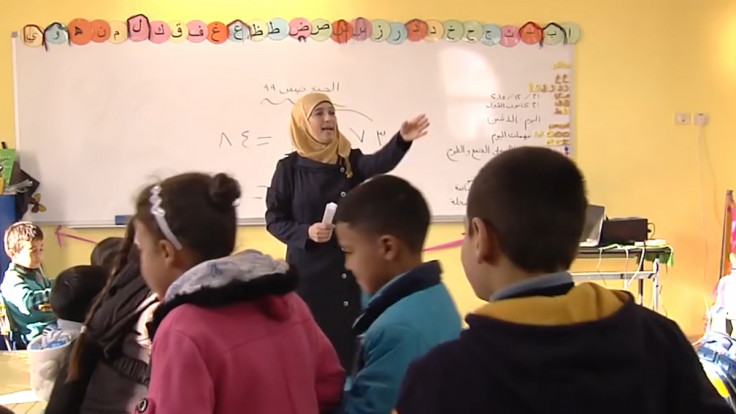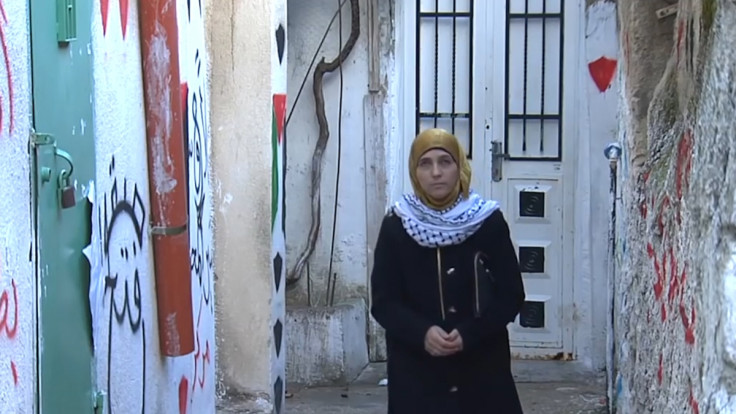Palestinian ex-refugee teacher Hanan Al Hroub: 'I help children overcome trauma with play'
Hanan Al Hroub is a teacher at Samiha Khalil High School in the Palestinian city of al-Bireh, near Ramallah in central West Bank. Her classes are fun, colourful and interactive, with games and traditional Arabic songs. Yet with many of her pupils deeply traumatised by violence, poverty and insecurity in a region which continues to suffer the impact of occupation and intra-Palestinian division, Al Hroub's classes provide much more than an education. They provide a safe space and a lifeline.
"I help children overcome their trauma by letting them play. In the classroom they have things they would not have anywhere else. They feel really safe inside the classroom. We are all a family, we are all a team inside the classroom," Al Hroub, winner of the Global Teacher Prize 2016, tells IBTimes UK.
"It's easy for them to feel happy there. They have the opportunity to play and learn at the same time, they have a purpose. The children feel connected to each other and they talk to each other. They talk to each other and gain each other's trust, and from there I have changed their personalities for the better, but the trust has to come first."

Using her own experience of growing up in a refugee camp near Bethlehem, Al Hroub has developed her own specialist approach to teaching troubled children. With the slogan "No to Violence", she focuses on fun and play to "take minds away from the problems children face in real life".
Her approach – shared at conferences and teacher training seminars – has seen substantial results, too. It has led to a decline in violent behaviour in schools where this is usually a chronic problem. "However, after my intervention the violence cut down to one case of violence in two days and it eventually came down to zero instances of violence after a month," Al Hroub says.
Educating children in this tense environment is a difficult task, but it was her own experience that was the catalyst for her work. Growing up in a refugee camp, Al Hroub regularly witnessed violence. "My life was really hard in the refugee camp. If we are talking about childhood, children in the camp didn't have one," Al Hroub says. "It was hard for adults and children. We were restricted from all our needs. Palestinians suffer everywhere, whether in a refugee camp or not."

One incident in particular spurred Al Hroub to go into teaching. While walking home from school one day, her children saw their father get shot. "There were soldiers firing bullets at my children. My children were traumatised and I had to take it upon myself to teach them how to cope with their trauma," she explains.
"I felt that other children besides mine would suffer from the same trauma, I felt they would get lost if I was not teaching them. So I changed my proficiency in university to education in order to get the qualifications to be a teacher."
There has been some progress in achieving children's rights in occupied Palestinian territory, but challenges remain. The wall – or fence in some areas – zigzags through the West Bank, affecting children's access to education, healthcare, water and more.
For children living in refugee camps and villages without a school, access to a good education is difficult. Research by Unicef in 2013 found more than 2,500 children have to travel through at least one checkpoint a day to go to school – a situation which contributes to school dropouts and child labour.
And, as Al Hroub adds, the number of classes offered are simply not enough which leads to chronic overcrowding. There is also a lack of materials and resources, meaning Al Hroub and other teachers in the region have to improvise to the best of their abilities.
"We have overpopulated classrooms in Palestine, with over 35 children in one class," she says. "Some of the classes have very poor infrastructure as well."
Al Hroub's win comes at a time of escalating tensions between Palestinians and Israelis. In the past five months, Palestinian street attacks have killed 28 Israelis and two Americans. Israeli forces have killed at least 184 Palestinians, 124 of whom Israel says were assailants. The majority of others were shot dead during protests.
As Israeli officials blame Palestinian leaders and social media for inciting the violence, Palestinians say it is the byproduct of deep-seated frustration and despair after nearly five decades of occupation.
As Al Hroub accepted her award, Palestinians in the audience at the ceremony waved their nation's flag. Drowning out the beginning of Al Hroub's acceptance speech, they chanted: "With our souls, our blood, we sacrifice for you Palestine."
Looking ecstatic as she was handed the award, Al Hroub said: "I did it, I won!"
"I am proud to be a Palestinian female teacher standing on this stage," she added.
© Copyright IBTimes 2024. All rights reserved.






